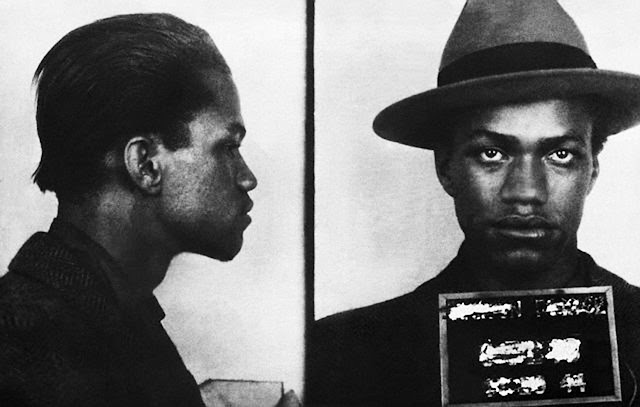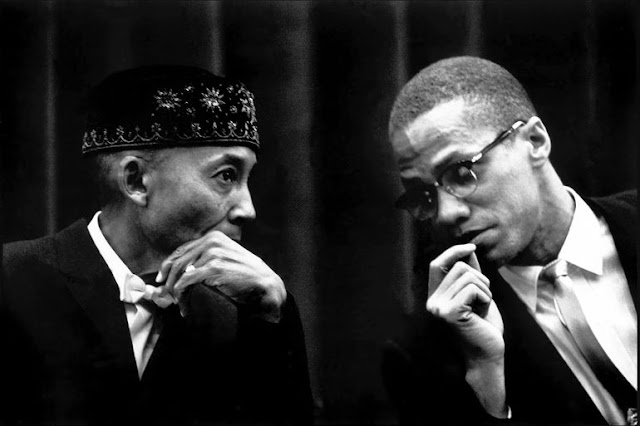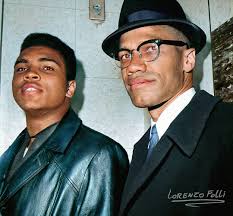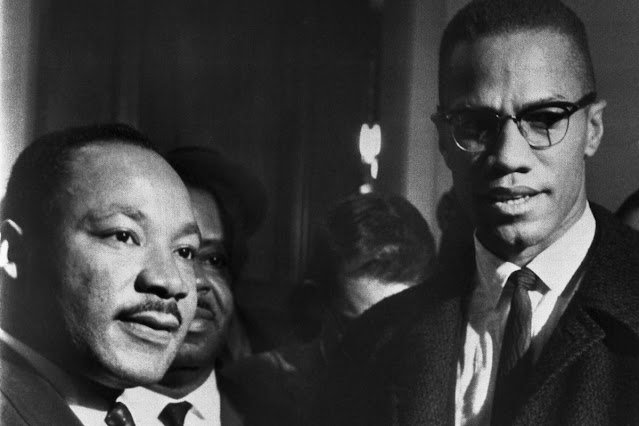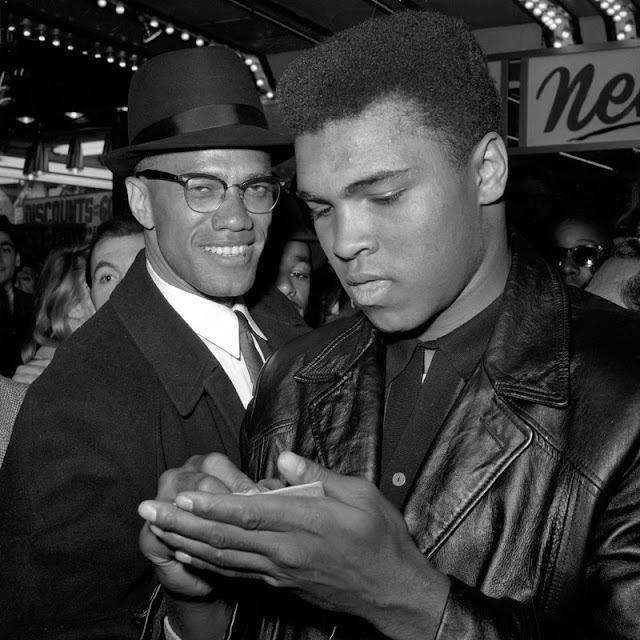 |
| Ali under arrest after his refusal to step forward and accept induction into the Army in 1967. |
Note—This post was adapted from an entry way back in April of 2010 marking
the anniversary of Muhammad Ali’s Draft Resistance. That was nearly fifty years ago, but may have
begun the Champ’s greatest battle until his struggle with Parkinson’s disease.
On April 28, 1967 the Boxing Heavy Weight Champion of the World,
Muhammad Ali, three times refused a direct order to step forward and accept
induction into the Armed Forces at
an Induction Center in Houston, Texas. He was arrested and charged
with Draft evasion, a Federal crime punishable by five years in prison and a $10,000 fine. Within hours the New York State Boxing Commission suspended his license to fight and
stripped him of his title. Other boxing commissions rapidly fell into line.
In just a few short years The Champ had fallen from being Cassias
Clay, a national hero as an Olympic
Gold Medal winner and the pretty boy
poet who electrified the boxing
world with his speed and power to a reviled pariah. His slide, at least in the eyes of many White fans, began when Malcolm X recruited Clay into the controversial Nation of Islam.
 |
| As a 1960 Olympic Gold Medalist, young Cassius Clay of Kentucky was an over-night American Hero. |
The announcement was made just after the fighter became the youngest man ever to take the Belt away from a reigning champion. He beat
the powerful Sonny Liston in one of
the most watched fights in history
in Miami on February 25, 1964. Within
days Elijah Muhammad, leader of the
Nation of Islam, gave him the name Muhammad Ali. Ali had to struggle to get the press,
public, and opponents to accept both
his new religion and new name.
Over the next three years he repeatedly defended his title, including a rematch with Liston, and a defeat
of former champ Floyd Patterson. But many of the fights were against lightly regarded white hopes across North America and Europe. Ali dominated them all and continued to entertain with his poetry and boasting
of being The Greatest.
He also became a public face of the Nation of Islam and
a huge recruitment lure for them in
the Black community. He spoke
out more frequently on race
relations and endorsed the militant
Black separatism espoused by Malcolm X.
He finally had a truly tough opponent to face when he went
against Ernie Terrell on February 6,
1967 at the Astro Dome in
Houston. Terrell had taunted Ali in the press and at the
weigh in refusing to call him by his new name.
Enraged, Ali pounded him for 15 rounds taunting him
with “What’s my name, Uncle Tom…What’s my name.” Many observers
believed that Ali could have knocked
Terrell out early in the fight but carried
him just to do more damage. White fans were even more outraged by Ali than ever.
About this time the Selective Service System began reviewing the Champ’s draft status. Although they always denied that the review was anything
but routine, almost no one believed
them after Ali began to make public
statements against the Vietnam War.
In 1964 the young Clay had been called up but rejected for failing the Armed Forces qualifying test because of poor reading and writing scores. By 1967,
with the need for large numbers of fresh
draftees for Vietnam, the standards
for those tests were significantly
lowered and Ali was declared
eligible for the draft.
When he was called up again, he refused to step forward on two grounds. The first
was that he was called as Cassius
Clay and he no longer would answer
to his slave name. The second
was on the religious grounds
that he could not fight in any war
that was not declared holy and just
by Elijah Muhammad. He based what he considered a good faith claim of conscientious objection on this belief.
Publicly, he also questioned the Vietnam War itself. “No
Viet Cong ever called me Nigger,”
he famously told an interviewer. The press was almost unanimous in mocking
the notion that a professional
fighter could be a C.O.
On June 27, 1968, a jury convicted him after deliberating only 28 minutes. He immediately appealed and the case slowly
wended through the courts. A Court of Appeals upheld the verdict and
the case was sent to the Supreme
Court.
 |
| There was open gloating in the press--along with a flat refusal to use his chosen name--when Ali was convicted, |
While awaiting a decision on his appeal, Ali boxed in Europe and spoke frequently on college
campuses. The war dragged on and became more unpopular with broader and broader segments of society.
Public support began to shift
somewhat to Ali. He was finally allowed to fight in Georgia in October 1970 crushing Jerry Quarry in three rounds. Shortly after the fight the New York Supreme Court ruled that Ali
had been unjustly stripped of his
license by the Boxing Commission.
He was able to fight again in Madison Square Garden in December
beating top contender Oscar Bonavena in a tough fight.
That set up a bout against undefeated
and undisputed Heavy Weight Champion
Joe Frazier at the Garden the
following March. The much hyped Fight of the Century ended with a
unanimous decision for Frazier after
an epic 15 round battle.
Ali got better news when the Supreme Court finally heard his appeal. On June 28 the Court unanimously overturned Ali’s conviction without ruling of the substances of his
Conscience Objection claim. The court
ruled procedurally that the indictment failed to say which of Ali’s
claims of exemption were rejected and for what reason.
With the war winding down and unpopular, the Government declined to re-try the case. Muhammad Ali was free.
He returned to his quest to regain the Championship. Ken
Norton handed him his second defeat and was then beaten by Ali in a re-match. A re-match with Frazier, by this time himself
dethroned by George Forman, resulted
in a unanimous decision for Ali setting up a title match with Forman.
 |
| Ali's rematch with George Foreman--The Rumble in the Jungle drew the largest world wide audience to date. |
The Rumble in the Jungle resulted in Ali reclaiming the title in a match in Zaire which claimed an unprecedented
world wide audience. Ali went on to
numerous title defenses against opponents
worthy and not. He beat Forman again in Thrila in Manila, Norton twice more, and up and comers Alfredo Evangelista and Ernie Shavers before youthful Olympic
Champion Leon Spinks finally beat
him in February 1978.
The following September he won the WBA
half of the now divided championship back for a record third time by beating Spinks in a rematch. Afterwards, he retired undefeated.
He came out of retirement to try
and win the Championship for the fourth time from Larry Homes, but Homes hammered
him and he was unable to come out
for the 11th round. After one more
fight and loss he permanently retired
in 1981 with a life time professional
record of 61 fights, 57 victories, 37 wins by knock out and only five
losses.
In the years since his retirement the controversy
over his draft resistance subsided as
Ali’s stature grew and the public affection for him has deepened.
Abandoning the Nation of Islam and its separatism in 1975 in
favor of mainstream orthodox Sunni Islam
helped ease his acceptance. So did his many acts of charity and community
service.
But it was his grace and courage in coping with increasing
disability due to Parkinson’s
disease, probably the result of repeated
head trauma as a boxer that endeared him to many.
Ali received many awards and accolades. He was called the
most famous man in the world, the greatest athlete of the 20th Century, and the greatest boxer of all time. He was awarded the Presidential Medal of Freedom and numerous international awards.
 |
| Lighting the Torch at the 1995 Atlanta Games despite shaking with Parkinson's was the emotion highlight of the Games. |
The pinnacle of his public
acceptance and a moment of high
emotion was when he was chosen to
light the Olympic Torch at the 1996 Atlanta
Games.
But perhaps no honor spoke more
loudly about how his draft resistance had not only been forgiven, but put in an appreciative context was when he was selected by the
state of California Bicentennial
Commission for the U.S. Constitution to “personify the vitality of the U.S.
Constitution and Bill of Rights” public
events throughout 1988 starting with the Tournament
of Roses Parade.
Ali had a turbulent personal life. He was married
four times, unions which produced six natural children including his
youngest daughter, Laila Ali the
retired women’s World Super Middleweight
champion. He also had and supported two other daughters out of wed lock. On November 19, 1986, Ali married Yolanda “Lonnie” Williams, a friend since
his youthful days in Louisville. Together
they adopted one son, Asaad Amin.
Lonnie was his inseparable companion,
and increasingly Ali’s voice as
Parkinson’s first garbled his speech and
finally left him publicly mute. Their relationship has alienated him from
some of his oldest children, particularly the four from his second marriage to Khalilah Ali.
 |
| Ali and his wife Lonnie as he was honored in his hometown of Louisville. |
With Lonnie at his side and increasingly
frail Ali continued to make public appearances in support of favored charities and causes and seemed to enjoy them along
with the accolades and attention at awards ceremonies and testimonials. Until the last couple of years he would
still mug a boxing pose for photographers.
Ali’s story was often told,
including his own book, The Greatest My Own Story co-written
by Richard Durham and edited by Toni Morrison originally released in 1975. There have been several other biographies,
some hagiography and some blatant racist smears. Aspects of his life and career were
captured in numerous documentaries. But in 2001 the Academy Award nominated Ali starring
Will Smith as the boxer, sensitively
examined his whole life, not just a parade of ring movements.
But his health was rapidly declining
and the public appearances became rarer. Despite the limitations, he still
spoke out through his wife. In December
he released a statement Donald Trump’s proposal to ban Muslims from entering the United States. “We as
Muslims have to stand up to those who use Islam to advance their own personal
agenda.”
Ali barely survived a crisis in
2013 and was hospitalized repeatedly since then. A few days ago he was admitted to a Phoenix,
Arizona hospital where he died last night.
This morning the world awakens to an out pouring of grief and a chorus of
salutes. There will even be crocodile tears from those who persecuted him and despised what he stood for—maybe even from The Donald.

